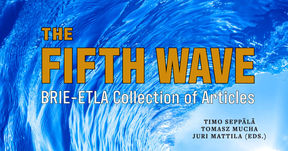Audiobooks can today be created with AI

The Department of Industrial Engineering and Management (TUTA) has published its first AI audiobook (four chapters of the book) conducted as an auto-ethnographic study project during the summer 2023 from the book ‘The Fifth Wave – BRIE-ETLA Collection of Articles´ edited by Timo Seppälä, Tomasz Mucha and Juri Mattila. Autoethnography is an autobiographical way of conducting research, in which the researcher's own experiences and the field notes written or otherwise produced from them form the central material of the research.
The motivation behind the AI-based audiobook project was quite straightforward. A colleague of senior lecturer Timo Seppälä from the machinery industry once mentioned that he didn't have the time to read Timo’s book, but he could listen to it while commuting to work or returning home.
How was the AI-based audiobook done?
“I read 20 and my colleague Tomasz 50 sentences to the AI tool. We then discovered that 50 sentences produced much better sound quality, so I went back to the studio and read another 60 sentences. Based on these, the AI tool cloned our voices and used those as narrator for the book”, explains Timo.
The producer of the book, Laura Loikas, is a student of industrial engineering and management at Aalto. She was hired for a month during the summer to work on the project. Laura compared and chose the technology to be used, did the cloning of the voices and edited the articles of the book so that AI could read them. Then she produced the mp3 files and edited the parts where AI made mistakes. Altogether the production costs were around 200 Euros without salary costs.
“Educational materials are used to be produced in written form, but we see that in the future any written teaching material can be produced in audio by using AI tools and applications. This will also give new tools to the student to learn things regardless of location. As a result of this project, we can now transform written materials into audio with reasonable quality, reduced costs, and increased efficiency. Next time, we will provide instructions for this process”, says Timo.

Read more news

Join the Unite! Virtual Education Summit- Registration now open
Join us in shaping international collaboration! This online event takes place 12 March, 2026.
Apply Now: Unite! Visiting Professorships at TU Graz
TU Graz, Austria, invites experienced postdoctoral researchers to apply for two fully funded visiting professorships. The deadline for expressions of interest is 20 February 2026, and the positions will begin on 1 October 2026.Soil Laboratory Exhibition – Exploring the Dialogue Between Human and the Earth in Utsjoki
Soil Laboratory explores the relationship between humans and the earth as a living landscape through ceramic practices in Utsjoki.






